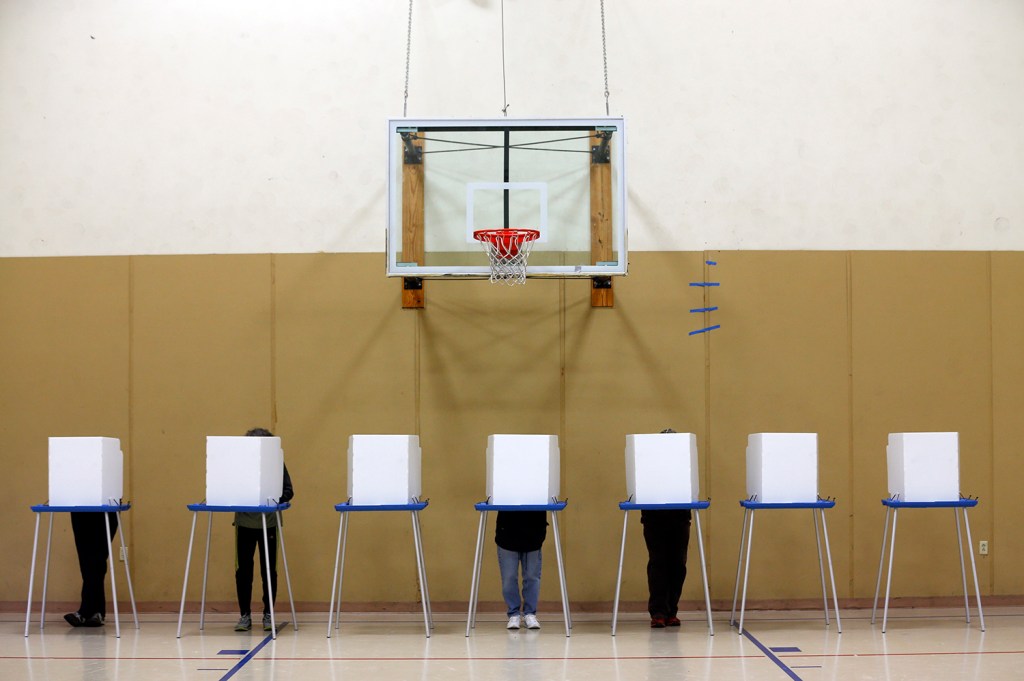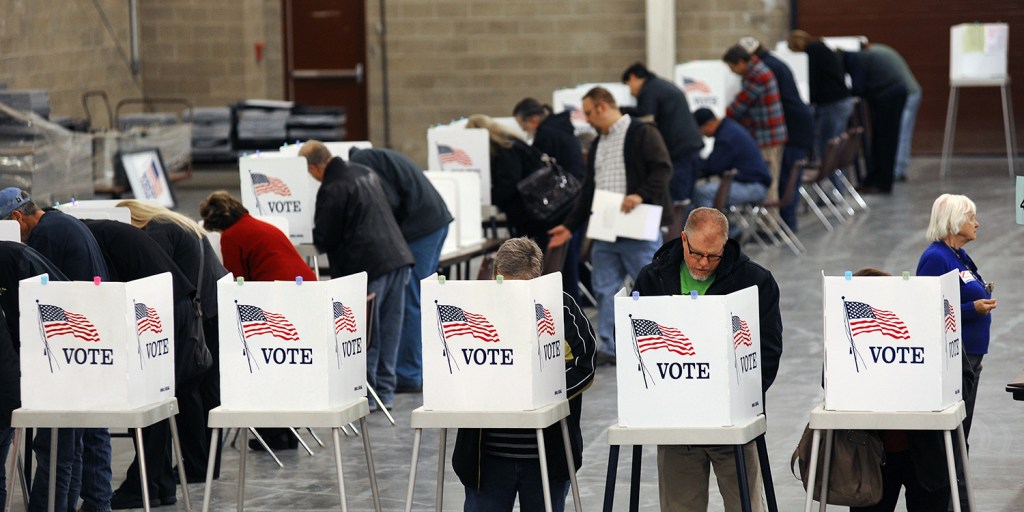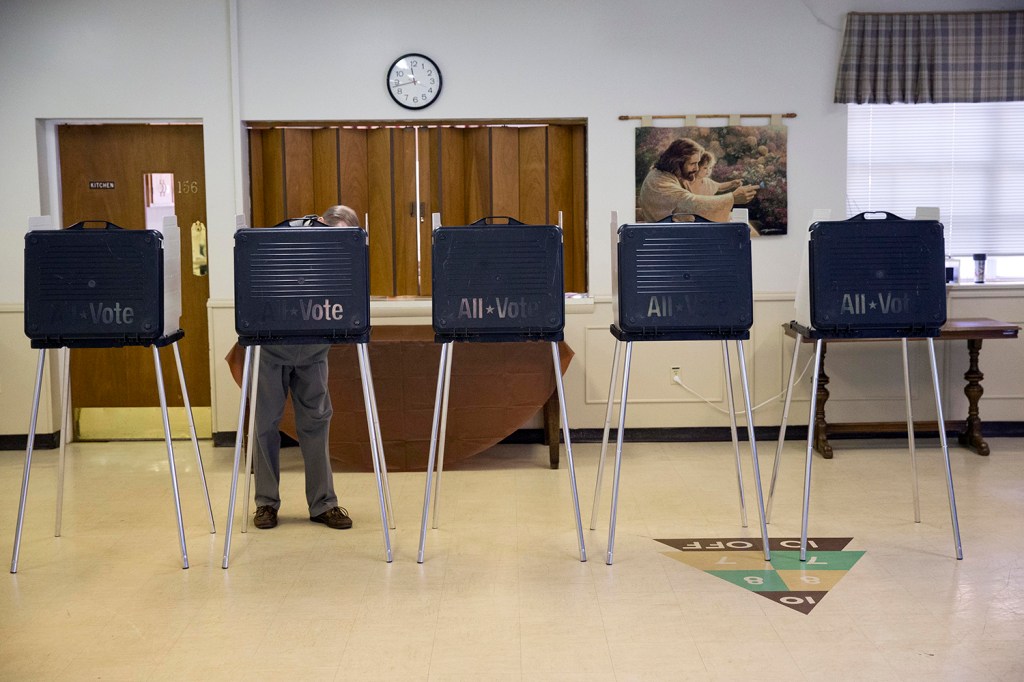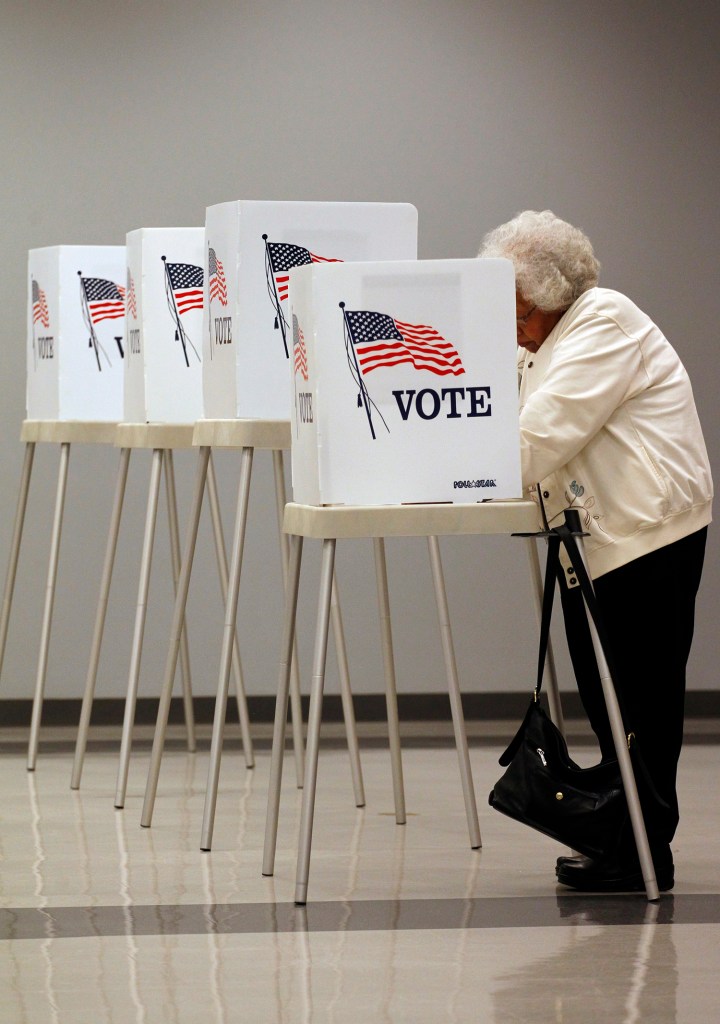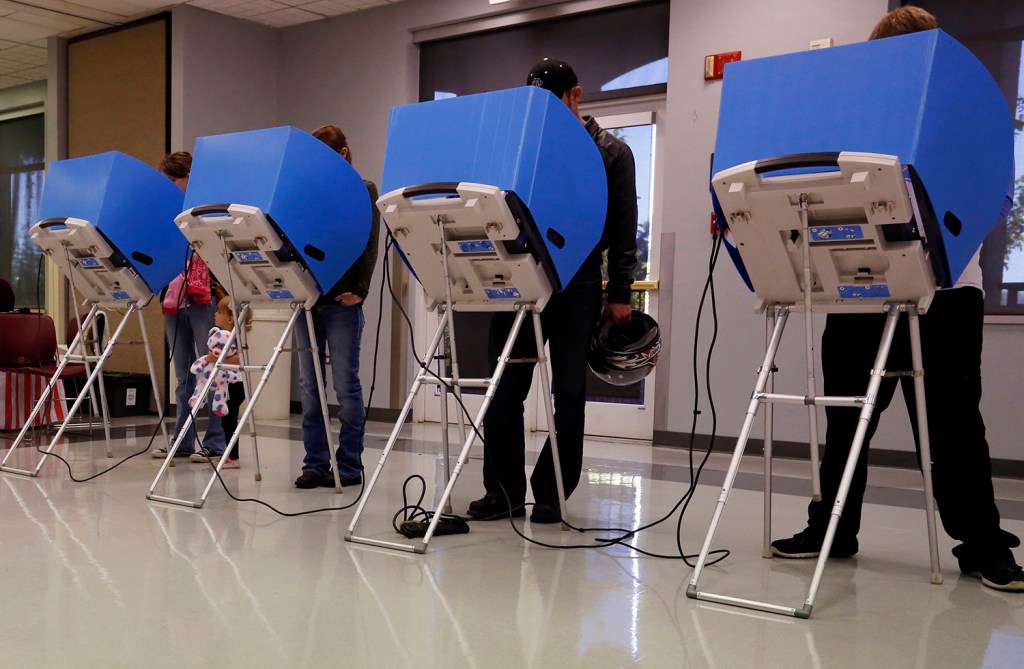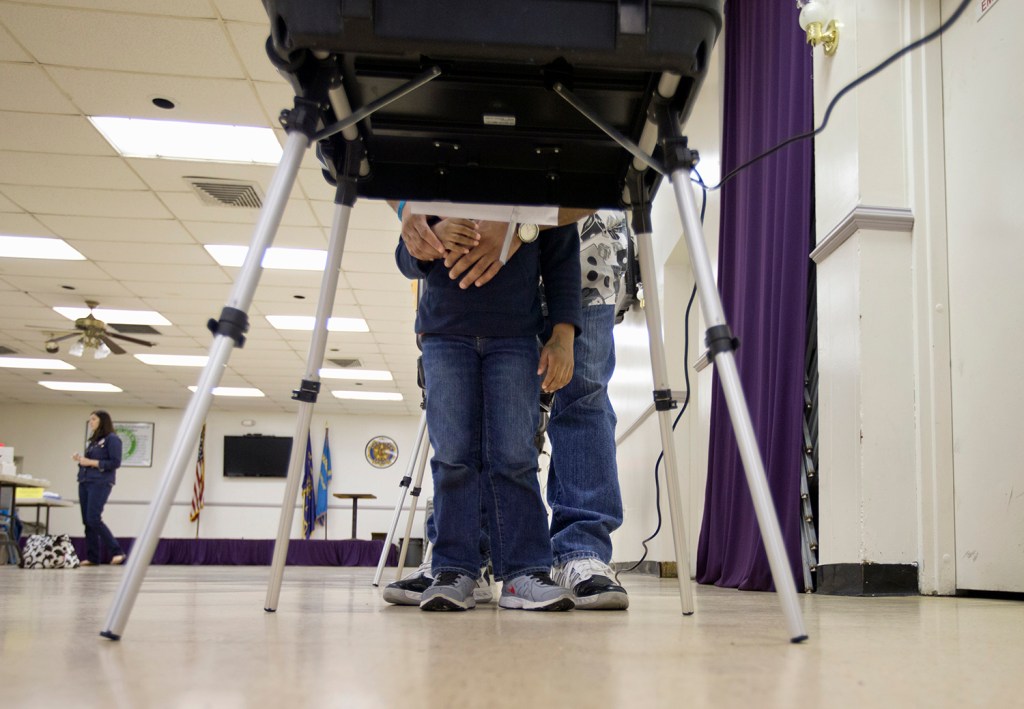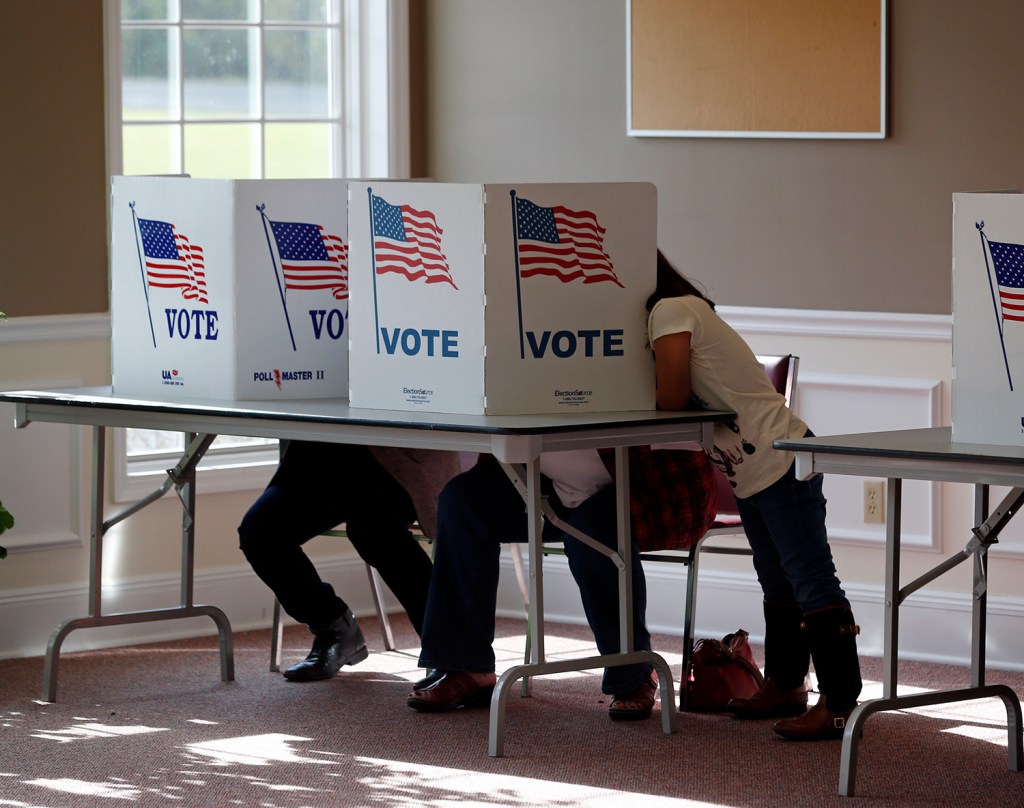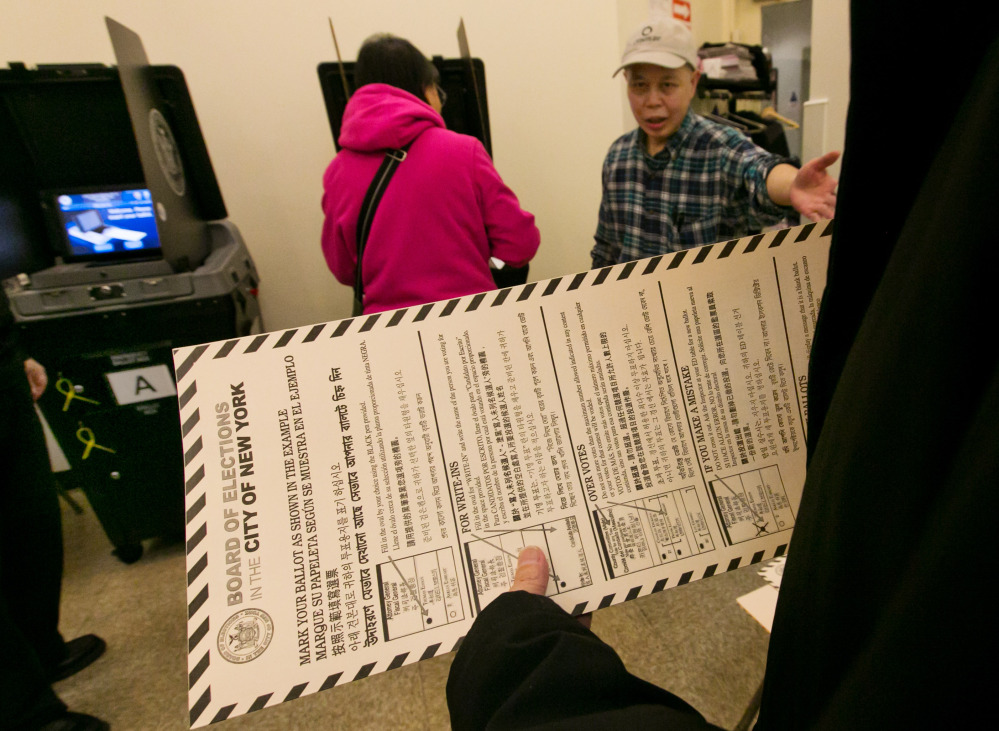Coast to coast, voters cast ballots with an audible harrumph on Tuesday – many of them unhappy with their choices and doubtful things will get better no matter who wins.
There’s Emily Conover, a 39-year-old saleswoman from Elizabethtown, Kentucky, who voted for Democratic challenger Alison Lundergan Grimes over Senate Republican leader Mitch McConnell. Conover said she “didn’t really like either of them.”
There’s Ron Buck, a 44-year-old roofer from Fairway, Kansas, who voted to re-elect Republican Gov. Sam Brownback and GOP Sen. Pat Roberts but said “both seem kind of like leftovers you don’t want to eat.”
There’s George Butler, who voted for a GOP congressional candidate in Toms River, New Jersey, but wished he’d had better options.
“The Republicans are too much to the right, and the Democrats are too much to the left,” Butler said. “As a moderate, this leaves me out of luck.”
Despite the sour mood that rippled across the country this Election Day, there was hope mixed in with the voices of anger and cynicism.
Kevin Breaux, an independent who voted in suburban New Orleans, is hoping for more – yes, more – gridlock in Washington.
“That’s a good thing,” said Breaux, who voted for tea party candidate Rob Maness over Democratic Sen. Mary Landrieu. “It’s far better than Obama advancing his liberal agenda.”
Danielle Glover, 28, who voted in Commerce City, an industrial suburb northeast of Denver, held the opposite view, hoping Democrats could hold off a Republican takeover of the Senate.
Whatever the results, Glover said, “I would hope that once we get past the election, that elected officials from both parties can sit down and work on policies together.”
Count Carolyn Iverson, who voted at the Danville Women’s Club in Danville, California, among the few who found an element of joy in the midterm balloting.
She made it a point to vote on Tuesday, rather than early, because “it’s more fun to go to the polls than voting absentee.”
Iverson, an independent, said things aren’t perfect, but President Barack Obama has done “a decent job” and Republicans haven’t offered much of a plan.
More common was the sentiment of Dave Duvall, voting in Springfield, Illinois, a former carpenter who voted Democratic but didn’t think either party would keep jobs from going overseas.
“We’ve lost opportunity,” he said. “And with that, you lose hope.”
Obama, deeply unpopular, wasn’t on the midterm ballot but he was still very much on the minds of many voters.
“I’m just waiting for him to be gone,” said Kristi Johnson, a 36-year-old pharmacist from Raleigh, North Carolina.
Indeed, many of those casting ballots already were starting to turn their thoughts to the presidential race in 2016.
Reginald Valentine Sr., in New York City, said he “really, really, really” would like to see the country elect a female president. That would be Hillary Rodham Clinton.
Julie English, in Arvada, Colorado, thought GOP Sen. Rand Paul might be a viable candidate. Lisa Graas, from Elizabethtown, Kentucky, hopes former GOP Sen. Rick Santorum runs for president again.
But plumber Steve Rhodes, exhausted by all the political ads in North Carolina this year, isn’t ready to go there – 2016 – just yet.
“I’ve had enough of the commercials and everything,” he said.
Those turning out to vote on Tuesday weren’t the only ones having their say this election. More than 18 million Americans in 32 states voted early – either by mail or at early polling places.
This year’s early voters included Michael Laughlin, a self-described radical moderate in Denver, where the psychotherapist held out hope that Democrats will be able to keep control of the Senate and fretted about whether ordinary people are being heard anymore.
“My biggest hope is that we don’t do more damage than we’ve already done,” Laughlin said. “A Republican Senate could turn back the hands of time in a number of different areas,” including civil rights and the economy.
Overall, Laughlin said, “our country has gotten caught up in a system where the majority is counted not in people but in dollars.”
Millions more voters had their say in another way – by sitting this election out. Roughly 61 percent of the nation’s 223 million eligible voters were expected to stay home, said Curtis Gans, director of the Center for the Study of the American Electorate.
In Florida, equipment glitches at a polling place in Pensacola caused some would-be voters to bail out without casting ballots.
“I had a 7:45 meeting so I couldn’t wait any longer,” said Mark Hobbly, who had planned to vote for Democrat Charlie Crist for governor.
Skepticism about whether the elections would improve things was a recurring theme around the country.
In New Jersey’s Gloucester Township, Democrat Mark Madden said adding more Republicans to the mix in Congress would only add to the gridlock in Washington.
“If the Republicans are put in there, you might as well tell the president, ‘just go home,”‘ said Madden.
Back in Louisiana’s Jefferson Parish, Dennis Antill, an independent, spoke to the disillusionment felt by many nationwide.
“I’m a cab driver and you’d be surprised at all the races of people who get in and say they are fed up,” he said. “This country is in trouble.”
Party officials on both sides said there were few signs of widespread problems in the first hours of voting. In Hartford, Connecticut, voting was delayed at several polling places that did not receive voting lists in time for the 6 a.m. opening. Gov. Dannel P. Malloy, who is running for re-election, was among those forced to wait. Malloy’s campaign later sought a Superior Court order to extend voting hours past the 8 p.m. closing at polls that were affected by the delays.
Obama called in to a Connecticut radio station to urge Hartford residents who couldn’t vote in the morning to go back later and cast their ballots.
AP’s Jennifer C. Kerr, Stephen Braun and Kim Hefling in Washington, Martha Waggoner in North Carolina, Karen Mathews in New York, Stephen Singer in Connecticut, Sean Carlin in New Jersey, Rick Gentilo in New Hampshire, Nick Swedberg in Illinois, Brett Barroquere and Alex Sanz in Kentucky, Sadie Gurman in Colorado, Kristin Bender in California, Cain Burdeau in Louisiana, Melissa Nelson in Florida and John Hanna and Heather Hollingsworth in Kansas contributed to this report.
Follow Nancy Benac on Twitter at http://twitter.com/nbenac
Send questions/comments to the editors.

